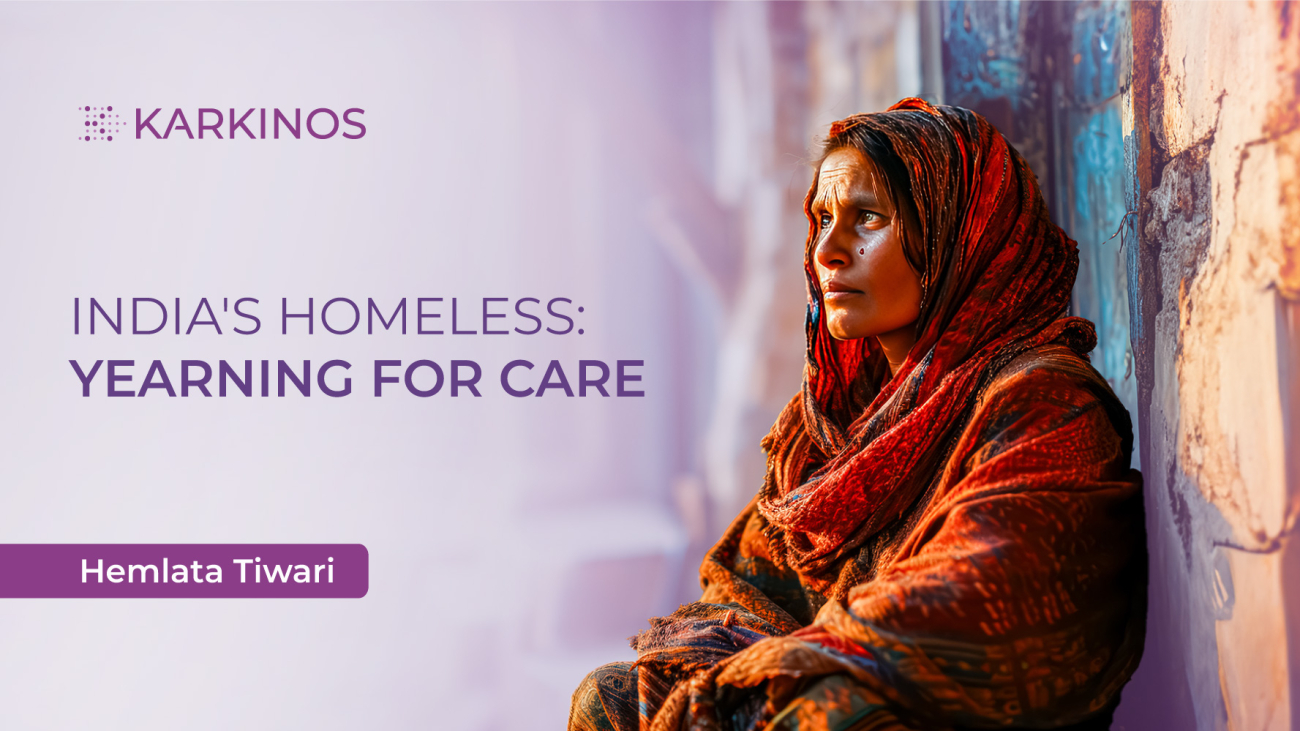Addressing the Health Needs of India’s Homeless: A Case Study
By Hemlata Mahendra Tiwari, Programme Manager, Early Detection, Karkinos Healthcare
The mere mention of cancer often invokes panic and fear among individuals, especially when it concerns their own health. Despite the critical importance of early detection in enhancing chances of recovery and reducing financial burdens, less than 1.25% of the population undergoes cancer screening (NFHS5 Data), primarily due to limited awareness and apprehensions regarding associated costs.
This reluctance towards early screening persists even amidst governmental and civil society initiatives aimed at promoting preventive healthcare. This trend is particularly concerning when considering the vulnerable segment of society, such as the homeless population.
With an estimated 1.7 million homeless individuals in India as per the 2011 census, the lack of access to basic amenities, including healthcare, exacerbates their already precarious living conditions. In bustling cities like Mumbai, where over 200,000 people reside on the streets, the situation is especially dire, with the specially abled facing heightened risks of exploitation and neglect.
Recognising the urgent need to reach out to this marginalized group, Team Karkinos, as part of its Early Detection Initiative, partnered with Seal Ashram, a Panvel-based organization dedicated to rescuing and rehabilitating homeless individuals, particularly those with disabilities. Seal Ashram’s work extends beyond mere rescues; it encompasses comprehensive rehabilitation efforts and endeavors to reunite individuals with their families whenever feasible.
Through this collaboration, the dire need for medical intervention among the homeless became starkly apparent. Living in unsanitary conditions predisposes them to various illnesses, including tuberculosis and HIV/AIDS. In a specialized medical camp organized by Karkinos Healthcare at the Ashram, a team of ten professionals screened over 100 patients, revealing alarming cases of terminal illnesses and infectious diseases.
With the assistance of shelter home staff, the team effectively communicated with and assessed the needs of each patient. The screening which included oral visual examinations, clinical breast examinations, and consultations with general physicians, proved to be highly effective. It underscored the significance of regular medical check-ups within the Ashram setting.
The significance of such interventions extends beyond immediate healthcare provision; it underscores the imperative for systemic reforms and support structures for vulnerable populations. Moreover, it underscores the necessity for healthcare initiatives to cater to diverse needs, including those of individuals with intellectual disabilities, who often face systemic barriers in accessing adequate care.
Despite the challenges posed by logistical complexities and resource constraints, the impact of such initiatives cannot be overstated. By combining medical expertise with empathy and community engagement, these efforts not only save lives but also foster a more inclusive and compassionate society.
In essence, addressing the healthcare needs of marginalized communities demands a multifaceted approach, one that encompasses both medical interventions and systemic reforms aimed at ensuring equitable access to healthcare for all, regardless of their socioeconomic status or living conditions.
Team Karkinos remains committed to extending its efforts to underserved groups in an affordable and accessible manner. Such initiatives align closely with Karkinos’ overarching vision of delivering affordable and accessible healthcare to the most remote and marginalized communities.
About Hemlata Mahendra Tiwari

 Hemlata is a social entrepreneur with a well-demonstrated history of successfully managing her own organization dedicated to supporting street musicians. Her zeal for instigating change and fostering a more equitable society is evident in her endeavors. Prior to joining Karkinos, Hemlata contributed her expertise to DVET (Government of Maharashtra) and SDIT (Government of Haryana). Her impact extends to the realm of public speaking, having delivered a TED Talk, and she has been recognized for her dedication to social work with accolades from the Maharashtra Government as a young social worker.
Hemlata is a social entrepreneur with a well-demonstrated history of successfully managing her own organization dedicated to supporting street musicians. Her zeal for instigating change and fostering a more equitable society is evident in her endeavors. Prior to joining Karkinos, Hemlata contributed her expertise to DVET (Government of Maharashtra) and SDIT (Government of Haryana). Her impact extends to the realm of public speaking, having delivered a TED Talk, and she has been recognized for her dedication to social work with accolades from the Maharashtra Government as a young social worker.